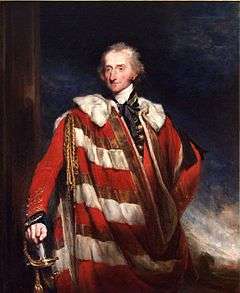John Egerton, 7th Earl of Bridgewater

John William Egerton, 7th Earl of Bridgewater FRS (14 April 1753 – 21 October 1823), known as John Egerton until 1803, was a British cavalry officer, and Tory politician from the Egerton family.
Egerton was the eldest son of the Right Reverend John Egerton, Bishop of Durham, and the grandson of the Right Reverend Henry Egerton, Bishop of Hereford, youngest son of John Egerton, 3rd Earl of Bridgewater. His mother was Lady Anne Sophia Grey. He joined the British Army in 1771 and was promoted to captain in 1776, to major in 1779, to lieutenant-colonel in 1790. He was promoted to colonel of 7th Light Dragoons in 1793. He was moved to be Colonel of 14th Light Dragoons serving under General Craufurd during the peninsular war to great acclaim. He remained colonel of the regiment for the rest of his life.
Egerton was promoted to major-general of Horse in 1795, to lieutenant-general in 1802 and to full general in 1812.
Egerton also sat as a Tory Member of Parliament for Morpeth from 1777 to 1780 and for Brackley from 1780 to 1803. The latter year, on the death of his first cousin once removed, Francis Egerton, 3rd Duke of Bridgewater, he succeeded as seventh Earl of Bridgewater.
Lord Bridgewater married on 14 January 1783 Charlotte Catherine Anne, only daughter and heir of Samuel Haynes. The marriage was childless. He died in October 1823, aged 70, and was succeeded in the earldom by his younger brother Francis. He left his estates in Bedfordshire, Buckinghamshire, Cheshire, Durham, Flint, Hertfordshire, Middlesex, Northamptonshire, Oxfordshire, Salop and Yorkshire to John, Viscount Alford, provided he had managed to become Duke or Marquess of Bridgwater with a suitable remainder. John did not fulfill the proviso in the will' failing in court to persuade the judge. However his heir got the clause declared illegal, so the 2nd Earl Brownlow commenced a damaging and lengthy case of litigation that in 1851 resulted in the Egerton family forfeiting the estates. Lady Bridgewater died in 1849, aged 85.

John Egerton, 7th Earl of Bridgewater, is commemorated by a memorial at the Bridgewater Chapel at St. Peter and St. Paul Church, Little Gaddesden. In the early 17th century, Thomas Egerton, 1st Viscount Brackley, had purchased Ashridge House, one of the largest country houses in England, from Queen Elizabeth I, who had inherited it from her father who had appropriated it after the dissolution of the monastries in 1539. Ashridge House served the Egerton family as a residence until the 19th century. The Egertons later had a family chapel with burial vault in Little Gaddesden Church,[1] where many monuments commemorate the Dukes and Earls of Bridgewater and their families.[2]
Notes
- ↑ Bridgewater Chapel at Little Gaddesden Church, accessed 24 July 2015
- ↑ Monuments in the Bridgewater Chapel, accessed 24 July 2015
References
- Leigh Rayment's Peerage Pages
- Leigh Rayment's Historical List of MPs
- Lundy, Darryl. "FAQ". The Peerage. External link in
|publisher=(help)
| Parliament of Great Britain | ||
|---|---|---|
| Preceded by Peter Delmé Gilbert Elliot |
Member of Parliament for Morpeth with Peter Delmé 1777–1780 |
Succeeded by Peter Delmé Anthony Morris Storer |
| Preceded by William Egerton Timothy Caswall |
Member of Parliament for Brackley 1780–1801 Served alongside: Timothy Caswall 1780–1789 Samuel Haynes 1789–1801 |
Parliament of the United Kingdom |
| Parliament of the United Kingdom | ||
| Preceded by Parliament of Great Britain |
Member of Parliament for Brackley 1801–1803 Served alongside: Samuel Haynes 1801–1802 Robert Haldane Bradshaw 1802–1803 |
Succeeded by Robert Haldane Bradshaw Anthony Henderson |
| Peerage of England | ||
| Preceded by Francis Egerton |
Earl of Bridgewater 2nd creation 1803 – 1823 |
Succeeded by Francis Henry Egerton |